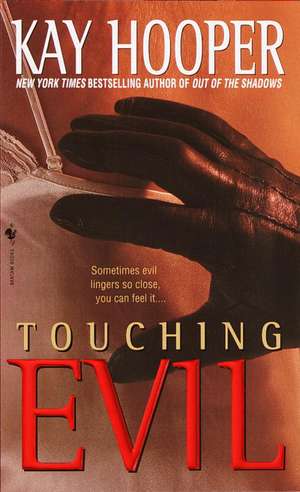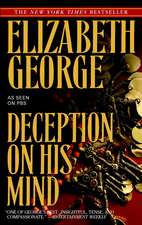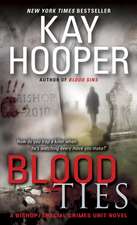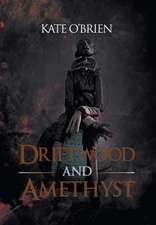Touching Evil: A Bishop/Special Crimes Unit Novel: Bishop/Special Crimes Unit
Autor Kay Hooper, Kay Hopper, Copyright Paperback Collectionen Limba Engleză Paperback – 31 iul 2001
Seattle police sketch artist Maggie Barnes has an extraordinary gift. She listens as traumatized crime victims describe their ordeals — and then uses those horrifying recollections to draw dead-on sketches of the assailants.
Some cops think Maggie is telepathic, that she can actually enter the victims’ minds. Only Maggie knows the truth behind her rare talent ... and she isn’t telling.
But her secret may be exposed when a madman seizes Seattle in his terrifying grip. He abducts women and blinds them, leaving them barely alive.
The police have one hope: the lone victim who might recover her sight. But they don’t know that Maggie has her own dark connection to the monster — an eerie link that may stretch back to a string of unsolved murders.
To stop the escalating terror, Maggie will have to push her abilities to the breaking point — even if it means confronting a predator whose powers seem to have no bounds....
Preț: 57.11 lei
Nou
Puncte Express: 86
Preț estimativ în valută:
10.93€ • 11.41$ • 9.04£
10.93€ • 11.41$ • 9.04£
Carte disponibilă
Livrare economică 14-28 martie
Livrare express 28 februarie-06 martie pentru 18.02 lei
Preluare comenzi: 021 569.72.76
Specificații
ISBN-13: 9780553583441
ISBN-10: 0553583441
Pagini: 384
Dimensiuni: 111 x 183 x 28 mm
Greutate: 0.2 kg
Editura: Bantam
Seria Bishop/Special Crimes Unit
ISBN-10: 0553583441
Pagini: 384
Dimensiuni: 111 x 183 x 28 mm
Greutate: 0.2 kg
Editura: Bantam
Seria Bishop/Special Crimes Unit
Notă biografică
Kay Hooper, who has more than thirteen million copies of her books in print worldwide, has won numerous awards and high praise for her novels. She lives in North Carolina.
Extras
Thursday, November 1, 2001
“She’s not going to like this.” Andy Brenner’s voice was more unhappy than worried.
John Garrett stepped past him into the small, bare room. “I’ll take the flak,” he said, his gaze already fixed on the large two-way mirror that dominated the far wall and offered them a secret view into another small room.
This mostly bare room contained a scarred wooden table and several chairs. Three women sat at the table, the two facing the mirror sitting close together in a posture that suggested they were clinging to each other even though they weren’t touching. The younger of the two wore very dark, heavy-rimmed sunglasses and sat rigidly in her chair, while the older woman watched her worriedly.
Sitting at right angles to them at the table, her back to the mirror, was the third woman, her face hidden from the watching men. It was impossible to guess her shape, since she wore a bulky flannel shirt and faded jeans, but a rather wild cloud of long, dark red hair made her appear slight.
Andy sighed. “It’s not flak I’m worried about. The chief likes to pretend Maggie works for us on our terms, but the rank and file know better; what Maggie wants, Maggie gets — and she wants total privacy when she’s interviewing a victim.”
“She’ll never know we’re here.”
“I keep trying to tell you, John — she’ll know.”
“How? I push this button, and we can hear what’s going on in the room but they won’t hear us, right? We see in, they don’t see out. So how will she know we’re here?”
“Beats the hell out of me, but she will.” Andy watched the other man move closer to the window and stifled another sigh. Anybody else and he would have stuck to his guns, but John Garrett was a hard man to say no to. Andy tried to think of an argument he hadn’t used yet, but before he could come up with anything, John pushed the right button, and a quiet, curiously pleasing voice reached them clearly and without any of the tinny, hollow characteristics that were usual with an intercom.
“...how difficult this is for you, Ellen. If I could, I’d far rather wait and give you more time to — “
“Heal?” The woman wearing the sunglasses laughed, a brittle sound holding no amusement. “My husband is sleeping in the guest room, Miss Barnes. My little boy is afraid of me. I can’t find my way through my own house without knocking over furniture and bumping into walls, and my sister has to cook for my family and help me dress every morning.”
“Ellen, you know I’m happy to help,” her sister protested, her soft voice half pleading and half weary. “And Owen wouldn’t be sleeping in the guest room if it wasn’t what you wanted, you know that.”
“I know he can’t bear to touch me, Lindsay.” Ellen’s voice was tight, a bare note away from shrill. Her hands were clasped together on the table, and her long, pale fingers writhed. “And I don’t blame him for that. I can’t blame him. Why would he want to touch me after — “
Maggie Barnes reached across the table and covered Ellen’s hands with one of her own. “Listen to me, Ellen.” Her voice remained quiet, but there was a new note in it now, an oddly soothing, almost hypnotic rhythm. “What that animal did to you can never be undone, but you can’t allow it to destroy you. Do you hear me? Don’t give him that power over you. Don’t allow him to win.”
Listening, John unconsciously tilted his head to one side, trying to focus on the strangely compelling undercurrent he heard in her voice. It was almost ... it was as if he knew that sound, as if it was something he only half remembered, like a song from his childhood or the last faint notes of music from a dream chased away by morning. Haunting.
Ellen didn’t attempt to free her hands, and her rigid posture seemed to ease a bit, just a bit. “I don’t want to remember,” she said, low, almost whispering. “Don’t ask me to remember.”
“I have to.” The regret in Maggie’s voice was achingly genuine. “I need your memories, need every scrap of information you can give me. I need you to remember everything you can, Ellen. Every sound, every scent, every touch.”
Ellen’s shudder was visible. “He touched ... I can’t bear to think about how he touched me. Please don’t make me...”
“Don’t make her.” Lindsay’s face twisted, and she put a hesitant hand on her sister’s arm.
“I don’t have a choice,” Maggie said. “The police can’t catch this animal without some idea who he is, what he looks like. We can’t even warn other women to watch out for him. Ellen, some detail you remember may help me put a face on him. I — ”
She turned her head suddenly, and John actually started in surprise at the abruptness of the movement — and the fact that he had the unsettling feeling she was looking directly into his eyes, even through the two-way mirror. She had very light brown eyes, the only unusual feature in a face that was pleasant but unremarkable.
And those pale eyes were looking right at him, he was sure of it. He felt it.
Behind him, Andy murmured, “Told you.”
Hardly conscious of speaking aloud, John said, “She sees me. How can she — ”
“X-ray vision. How the hell do I know?” Andy sounded as disgruntled as he felt. He hated it when Maggie was mad at him — and she was definitely going to be mad at him.
Maggie turned back to face the other two women and spoke gently. “I’m sorry, but there’s something I have to do. I’ll be right back.”
Lindsay gave her an accusing look, then leaned closer to her sister as though in support. Ellen didn’t say a word, but she had the appearance of someone poised on the brink, frozen, as if unable to move forward or back.
John turned his back to the mirror as Maggie left the interview room. “She must have heard us,” he said.
“No,” Andy said. “She didn’t hear us. This room is soundproofed, I told you that. She just knew, that’s all.”
The door of the observation room opened and Maggie Barnes stepped inside. John was surprised at how tall she was — at least five-ten, if he was any judge. But he hadn’t been mistaken in thinking her slight; she wasn’t unnaturally thin, just one of those very slender, almost ethereal women. He wondered if she dressed in the bulky layers out of some need to have more weight or substance.
When he looked at her face, John decided he’d been wrong in thinking it unremarkable. Graced with very regular features, not quite pretty but pleasant, it was saved from plainness by those slanted, catlike golden eyes and something stamped into her expression, innate to it, that was more than compassion and less than pity, a kind of empathy for the feelings of others that he knew was far more rare and valuable than high cheekbones or a perfect nose.
She looked at him briefly, a head-to-toe glance that missed nothing along the way and left him with the disconcerted realization that he had been very accurately weighed and analyzed.
Andy did his best to melt into the woodwork before she looked at him but obviously felt pinned to it instead when those catlike eyes fixed on him. He held his hands out, palms up, and offered an apologetic shrug.
“Andy?” Her voice was very gentle.
“Sorry, Maggie.” He shifted uncomfortably, ruefully aware that he probably looked for all the world like a scolded schoolboy.
John stepped toward them. “It’s my fault, Miss Barnes. I asked Andy to bend the rules. My name is — ”
“I know who you are, Mr. Garrett.” Her gaze was direct, her voice matter-of-fact. “But some rules apply to you too, whether you like it or not.”
“It wasn’t a question of rules not applying to me. I have special permission to observe the investigation.” He only just managed not to sound defensive, which surprised him.
“And that includes watching and listening like a voyeur while a shattered woman forces herself to remember a nightmare you can’t even begin to imagine? Is that the observing you were given permission to do?”
John stiffened, but her accusation struck a nerve and left him at least momentarily silent. Maggie didn’t wait for a response but went on coolly. “How would you feel, Mr. Garrett, if two strange men had watched and listened in silence and secret while someone you cared about relived the entire horrific experience of being brutally raped and maimed by an animal?”
That struck more than a nerve. He drew a breath and let it out slowly. “You’re right. I’m sorry.”
Andy said, “Sounded like you were reaching her there for a minute. The interruption won’t help things, will it?”
“No. No, it won’t help things. I’ll try again, but she may not be willing to talk to me anymore today.”
John felt the reproach, even though she wasn’t looking at him. “I’m sorry,” he said again. “I didn’t intend to interfere. That’s the last thing I want to do.”
“Fine. Then you won’t mind leaving.” She stepped back, holding the door open in a clear invitation — if not a command — for them to leave.
Andy wasted no time in obeying, but John paused in the doorway and met her gaze steadily. “I would like to talk to you, Miss Barnes. Today, if possible.”
“If you want to wait around, suit yourself.” Her tone was indifferent, but the steady golden eyes never left his. “I may be a while.”
“I’ll wait,” John said.
Hollis was awake but didn’t move or make a sound to indicate that. For the first few moments it was always like this, tension and terror until her scrambling mind left nightmare and caught up with reality.
Which was also a nightmare.
The bandages over her eyes — over where her eyes had once been — were becoming a familiar weight. She didn’t yet know how she felt about the fact that beneath those bandages were now someone else’s eyes. An accident victim who had lost her life but left a signed donor card behind.
The surgeon, proud of his groundbreaking work, had been surprised and rather aggrieved when Hollis’s only question had been one he obviously considered unimportant.
“What color are they? Miss Templeton, I don’t think you understand the complexity — ”
“I understand, Doctor. I understand that you believe medical science has advanced to the point that I’ll be able to see with this poor woman’s eyes. And I understand that it’ll be days at least, possibly weeks, before we find out if you’re right. In the meantime, I’m asking what color my ... new ... eyes are.”
Blue, he’d said.
Her old ones had been brown.
Would she be able to see? She didn’t know, and she suspected that her doctor, for all his confidence in his abilities, was unsure of the surgery’s outcome as well. The optic nerve was a tricky thing, he didn’t have to tell her that. And then there were all the other nerves, the blood vessels, the muscles. Far too many tiny connections to be certain of anything. They didn’t think her body would reject the new eyes, and anti-rejection drugs would probably make certain of that, but nobody seemed nearly as sure what her brain might do.
Vision was as much the mind’s interpretation of images as it was anything else, after all. With the intricate connection between organ and mind severed and then painstakingly rebuilt, who really knew what her brain’s response might be?
Hell, maybe it was no wonder she hadn’t even been able to decide how she felt about it.
Most of the other physical injuries had been surprisingly minor, given everything she’d been through. The broken ribs were healing, though she still breathed carefully, and doctors had repaired the puncture in her lung. A few stitches here and there. Scrapes and bruises.
Oh — and she’d never be able to have children, but what the hell. No kid needed to be saddled with a probably blind, certainly emotionally wrecked mother anyway, right? Right.
I know you’re awake, Hollis.
She didn’t move, didn’t turn her head. That voice again, quietly insistent, as it had been virtually every day of the past three weeks. She’d asked a nurse once who it was that came to visit her and sit by her bed hour after hour, but the nurse had said she didn’t know, hadn’t seen anyone except the police officers who came regularly to ask gentle questions Hollis didn’t answer.
Hollis had so far refused to question the voice, just as she refused to speak to the cops or say any more than absolutely necessary to the doctors and nurses. She wasn’t ready to think about what had happened to her, far less talk about it.
You’ll be able to leave soon, the voice said. What will you do then?
“Stepping in front of a bus might be a good idea,” Hollis said calmly. She spoke aloud to remind herself that hers was really the only voice in the room. Of course it was. Because that other voice was just a figment of her imagination, obviously.
If you really wanted to die, you never would have crawled out of that building.
“And if I wanted rational platitudes from a figment of my imagination, I’d go back to sleep. Oh, wait — I am asleep. I’m dreaming. It’s all just a bad dream.”
You know better.
“Better that it happened? Or better that you aren’t just a figment of my imagination?”
Instead of answering either question, the figment said, If I handed you a lump of clay, what would you make, Hollis?
“What kind of question is that? One of those inkblot questions? Is my figment psychoanalyzing me?”
What would you make? You’re an artist.
“I was an artist.”
Before, you created art with your hands and your eyes and your mind. Whether or not the surgery is successful, you still have your hands. You still have your mind.
The figment, Hollis realized, didn’t believe she’d be able to see with these borrowed eyes either. “So I should just turn myself into a sculptor? It isn’t quite as simple as that.”
I didn’t say it was simple. I didn’t say it would be easy. But it would be a life, Hollis. A rich, creative life.
After a moment, Hollis said, “I don’t know if I can. I don’t know if I’m brave enough to start over.”
You’ll have to find out, then, won’t you?
Hollis smiled despite herself. So her figment could offer more than knee-jerk platitudes, after all. And the challenge was unexpectedly bracing. “I guess so. That or go looking for that bus to step in front of.”
“She’s not going to like this.” Andy Brenner’s voice was more unhappy than worried.
John Garrett stepped past him into the small, bare room. “I’ll take the flak,” he said, his gaze already fixed on the large two-way mirror that dominated the far wall and offered them a secret view into another small room.
This mostly bare room contained a scarred wooden table and several chairs. Three women sat at the table, the two facing the mirror sitting close together in a posture that suggested they were clinging to each other even though they weren’t touching. The younger of the two wore very dark, heavy-rimmed sunglasses and sat rigidly in her chair, while the older woman watched her worriedly.
Sitting at right angles to them at the table, her back to the mirror, was the third woman, her face hidden from the watching men. It was impossible to guess her shape, since she wore a bulky flannel shirt and faded jeans, but a rather wild cloud of long, dark red hair made her appear slight.
Andy sighed. “It’s not flak I’m worried about. The chief likes to pretend Maggie works for us on our terms, but the rank and file know better; what Maggie wants, Maggie gets — and she wants total privacy when she’s interviewing a victim.”
“She’ll never know we’re here.”
“I keep trying to tell you, John — she’ll know.”
“How? I push this button, and we can hear what’s going on in the room but they won’t hear us, right? We see in, they don’t see out. So how will she know we’re here?”
“Beats the hell out of me, but she will.” Andy watched the other man move closer to the window and stifled another sigh. Anybody else and he would have stuck to his guns, but John Garrett was a hard man to say no to. Andy tried to think of an argument he hadn’t used yet, but before he could come up with anything, John pushed the right button, and a quiet, curiously pleasing voice reached them clearly and without any of the tinny, hollow characteristics that were usual with an intercom.
“...how difficult this is for you, Ellen. If I could, I’d far rather wait and give you more time to — “
“Heal?” The woman wearing the sunglasses laughed, a brittle sound holding no amusement. “My husband is sleeping in the guest room, Miss Barnes. My little boy is afraid of me. I can’t find my way through my own house without knocking over furniture and bumping into walls, and my sister has to cook for my family and help me dress every morning.”
“Ellen, you know I’m happy to help,” her sister protested, her soft voice half pleading and half weary. “And Owen wouldn’t be sleeping in the guest room if it wasn’t what you wanted, you know that.”
“I know he can’t bear to touch me, Lindsay.” Ellen’s voice was tight, a bare note away from shrill. Her hands were clasped together on the table, and her long, pale fingers writhed. “And I don’t blame him for that. I can’t blame him. Why would he want to touch me after — “
Maggie Barnes reached across the table and covered Ellen’s hands with one of her own. “Listen to me, Ellen.” Her voice remained quiet, but there was a new note in it now, an oddly soothing, almost hypnotic rhythm. “What that animal did to you can never be undone, but you can’t allow it to destroy you. Do you hear me? Don’t give him that power over you. Don’t allow him to win.”
Listening, John unconsciously tilted his head to one side, trying to focus on the strangely compelling undercurrent he heard in her voice. It was almost ... it was as if he knew that sound, as if it was something he only half remembered, like a song from his childhood or the last faint notes of music from a dream chased away by morning. Haunting.
Ellen didn’t attempt to free her hands, and her rigid posture seemed to ease a bit, just a bit. “I don’t want to remember,” she said, low, almost whispering. “Don’t ask me to remember.”
“I have to.” The regret in Maggie’s voice was achingly genuine. “I need your memories, need every scrap of information you can give me. I need you to remember everything you can, Ellen. Every sound, every scent, every touch.”
Ellen’s shudder was visible. “He touched ... I can’t bear to think about how he touched me. Please don’t make me...”
“Don’t make her.” Lindsay’s face twisted, and she put a hesitant hand on her sister’s arm.
“I don’t have a choice,” Maggie said. “The police can’t catch this animal without some idea who he is, what he looks like. We can’t even warn other women to watch out for him. Ellen, some detail you remember may help me put a face on him. I — ”
She turned her head suddenly, and John actually started in surprise at the abruptness of the movement — and the fact that he had the unsettling feeling she was looking directly into his eyes, even through the two-way mirror. She had very light brown eyes, the only unusual feature in a face that was pleasant but unremarkable.
And those pale eyes were looking right at him, he was sure of it. He felt it.
Behind him, Andy murmured, “Told you.”
Hardly conscious of speaking aloud, John said, “She sees me. How can she — ”
“X-ray vision. How the hell do I know?” Andy sounded as disgruntled as he felt. He hated it when Maggie was mad at him — and she was definitely going to be mad at him.
Maggie turned back to face the other two women and spoke gently. “I’m sorry, but there’s something I have to do. I’ll be right back.”
Lindsay gave her an accusing look, then leaned closer to her sister as though in support. Ellen didn’t say a word, but she had the appearance of someone poised on the brink, frozen, as if unable to move forward or back.
John turned his back to the mirror as Maggie left the interview room. “She must have heard us,” he said.
“No,” Andy said. “She didn’t hear us. This room is soundproofed, I told you that. She just knew, that’s all.”
The door of the observation room opened and Maggie Barnes stepped inside. John was surprised at how tall she was — at least five-ten, if he was any judge. But he hadn’t been mistaken in thinking her slight; she wasn’t unnaturally thin, just one of those very slender, almost ethereal women. He wondered if she dressed in the bulky layers out of some need to have more weight or substance.
When he looked at her face, John decided he’d been wrong in thinking it unremarkable. Graced with very regular features, not quite pretty but pleasant, it was saved from plainness by those slanted, catlike golden eyes and something stamped into her expression, innate to it, that was more than compassion and less than pity, a kind of empathy for the feelings of others that he knew was far more rare and valuable than high cheekbones or a perfect nose.
She looked at him briefly, a head-to-toe glance that missed nothing along the way and left him with the disconcerted realization that he had been very accurately weighed and analyzed.
Andy did his best to melt into the woodwork before she looked at him but obviously felt pinned to it instead when those catlike eyes fixed on him. He held his hands out, palms up, and offered an apologetic shrug.
“Andy?” Her voice was very gentle.
“Sorry, Maggie.” He shifted uncomfortably, ruefully aware that he probably looked for all the world like a scolded schoolboy.
John stepped toward them. “It’s my fault, Miss Barnes. I asked Andy to bend the rules. My name is — ”
“I know who you are, Mr. Garrett.” Her gaze was direct, her voice matter-of-fact. “But some rules apply to you too, whether you like it or not.”
“It wasn’t a question of rules not applying to me. I have special permission to observe the investigation.” He only just managed not to sound defensive, which surprised him.
“And that includes watching and listening like a voyeur while a shattered woman forces herself to remember a nightmare you can’t even begin to imagine? Is that the observing you were given permission to do?”
John stiffened, but her accusation struck a nerve and left him at least momentarily silent. Maggie didn’t wait for a response but went on coolly. “How would you feel, Mr. Garrett, if two strange men had watched and listened in silence and secret while someone you cared about relived the entire horrific experience of being brutally raped and maimed by an animal?”
That struck more than a nerve. He drew a breath and let it out slowly. “You’re right. I’m sorry.”
Andy said, “Sounded like you were reaching her there for a minute. The interruption won’t help things, will it?”
“No. No, it won’t help things. I’ll try again, but she may not be willing to talk to me anymore today.”
John felt the reproach, even though she wasn’t looking at him. “I’m sorry,” he said again. “I didn’t intend to interfere. That’s the last thing I want to do.”
“Fine. Then you won’t mind leaving.” She stepped back, holding the door open in a clear invitation — if not a command — for them to leave.
Andy wasted no time in obeying, but John paused in the doorway and met her gaze steadily. “I would like to talk to you, Miss Barnes. Today, if possible.”
“If you want to wait around, suit yourself.” Her tone was indifferent, but the steady golden eyes never left his. “I may be a while.”
“I’ll wait,” John said.
Hollis was awake but didn’t move or make a sound to indicate that. For the first few moments it was always like this, tension and terror until her scrambling mind left nightmare and caught up with reality.
Which was also a nightmare.
The bandages over her eyes — over where her eyes had once been — were becoming a familiar weight. She didn’t yet know how she felt about the fact that beneath those bandages were now someone else’s eyes. An accident victim who had lost her life but left a signed donor card behind.
The surgeon, proud of his groundbreaking work, had been surprised and rather aggrieved when Hollis’s only question had been one he obviously considered unimportant.
“What color are they? Miss Templeton, I don’t think you understand the complexity — ”
“I understand, Doctor. I understand that you believe medical science has advanced to the point that I’ll be able to see with this poor woman’s eyes. And I understand that it’ll be days at least, possibly weeks, before we find out if you’re right. In the meantime, I’m asking what color my ... new ... eyes are.”
Blue, he’d said.
Her old ones had been brown.
Would she be able to see? She didn’t know, and she suspected that her doctor, for all his confidence in his abilities, was unsure of the surgery’s outcome as well. The optic nerve was a tricky thing, he didn’t have to tell her that. And then there were all the other nerves, the blood vessels, the muscles. Far too many tiny connections to be certain of anything. They didn’t think her body would reject the new eyes, and anti-rejection drugs would probably make certain of that, but nobody seemed nearly as sure what her brain might do.
Vision was as much the mind’s interpretation of images as it was anything else, after all. With the intricate connection between organ and mind severed and then painstakingly rebuilt, who really knew what her brain’s response might be?
Hell, maybe it was no wonder she hadn’t even been able to decide how she felt about it.
Most of the other physical injuries had been surprisingly minor, given everything she’d been through. The broken ribs were healing, though she still breathed carefully, and doctors had repaired the puncture in her lung. A few stitches here and there. Scrapes and bruises.
Oh — and she’d never be able to have children, but what the hell. No kid needed to be saddled with a probably blind, certainly emotionally wrecked mother anyway, right? Right.
I know you’re awake, Hollis.
She didn’t move, didn’t turn her head. That voice again, quietly insistent, as it had been virtually every day of the past three weeks. She’d asked a nurse once who it was that came to visit her and sit by her bed hour after hour, but the nurse had said she didn’t know, hadn’t seen anyone except the police officers who came regularly to ask gentle questions Hollis didn’t answer.
Hollis had so far refused to question the voice, just as she refused to speak to the cops or say any more than absolutely necessary to the doctors and nurses. She wasn’t ready to think about what had happened to her, far less talk about it.
You’ll be able to leave soon, the voice said. What will you do then?
“Stepping in front of a bus might be a good idea,” Hollis said calmly. She spoke aloud to remind herself that hers was really the only voice in the room. Of course it was. Because that other voice was just a figment of her imagination, obviously.
If you really wanted to die, you never would have crawled out of that building.
“And if I wanted rational platitudes from a figment of my imagination, I’d go back to sleep. Oh, wait — I am asleep. I’m dreaming. It’s all just a bad dream.”
You know better.
“Better that it happened? Or better that you aren’t just a figment of my imagination?”
Instead of answering either question, the figment said, If I handed you a lump of clay, what would you make, Hollis?
“What kind of question is that? One of those inkblot questions? Is my figment psychoanalyzing me?”
What would you make? You’re an artist.
“I was an artist.”
Before, you created art with your hands and your eyes and your mind. Whether or not the surgery is successful, you still have your hands. You still have your mind.
The figment, Hollis realized, didn’t believe she’d be able to see with these borrowed eyes either. “So I should just turn myself into a sculptor? It isn’t quite as simple as that.”
I didn’t say it was simple. I didn’t say it would be easy. But it would be a life, Hollis. A rich, creative life.
After a moment, Hollis said, “I don’t know if I can. I don’t know if I’m brave enough to start over.”
You’ll have to find out, then, won’t you?
Hollis smiled despite herself. So her figment could offer more than knee-jerk platitudes, after all. And the challenge was unexpectedly bracing. “I guess so. That or go looking for that bus to step in front of.”
Textul de pe ultima copertă
Seattle police sketch artist Maggie Barnes has an extraordinary gift. She listens as traumatized crime victims describe their ordeals -- and then uses those horrifying recollections to draw dead-on sketches of the assailants. Some cops think Maggie is telepathic, that she can actually enter the victims' minds. Only Maggie knows the truth behind her rare talent...and she isn't telling.
But her secret may be exposed when a madman seizes Seattle in his terrifying grip. He abducts women and blinds them, leaving them barely alive. The police have one hope: the lone victim who might recover her sight. But they don't know that Maggie has her own dark connection to the monster -- an eerie link that may stretch back to a string of unsolved murders. To stop the escalating terror, Maggie will have to push her abilities to the breaking point -- even if it means confronting a predator whose powers seem to have no bounds....
Descriere
Seattle police sketch-artist Maggie Barnes listens as crime victims describe their ordeals, and then draws dead-on sketches of their assailants. Some think Maggie is telepathic, but only Maggie knows the truth behind her talent. But her secret may be exposed when a madman abducts women and blinds them, leaving them barely alive. Maggie has her own dark connection to the monster--an eerie link that may stretch back to a string of unsolved murders.













